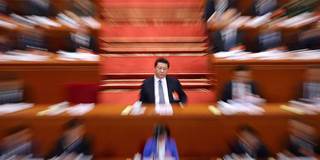Chinese President Xi Jinping has now been catapulted into the Pantheon of the founders of the People’s Republic, becoming as the most powerful leader that the world’s largest one-party state has had in decades. But Xi's ability to shape Chinese society may turn out to be far more limited than he, his allies, and most observers expect.
CLAREMONT, CALIFORNIA – At the end of the six-day 19th National Congress of the Communist Party of China (CPC), the roughly 2,200 delegates decided to add “Xi Jinping Thought on the new era of socialism with Chinese characteristics” to the CPC’s constitution. With that, it became official: the era of Xi has begun.
Only two previous Chinese leaders, Mao Zedong and Deng Xiaoping, have had their personally branded ideology enshrined in the CPC’s charter. Xi’s two predecessors, Jiang Zemin and Hu Jintao, did not have their names linked to any ideological doctrine, much less one elevated to such a high status within the CPC. Chinese leaders are clearly eager to confirm what the world already knew: Xi’s authority now equals that of the CPC’s heaviest heavyweights.
Besides symbolically catapulting Xi into the Pantheon of the founders of the People’s Republic, the 19th National Congress delivered him two substantive political victories. First and foremost, he stalled the designation of a successor, thereby leaving open the possibility that he himself could serve a third term as Chinese president.

CLAREMONT, CALIFORNIA – At the end of the six-day 19th National Congress of the Communist Party of China (CPC), the roughly 2,200 delegates decided to add “Xi Jinping Thought on the new era of socialism with Chinese characteristics” to the CPC’s constitution. With that, it became official: the era of Xi has begun.
Only two previous Chinese leaders, Mao Zedong and Deng Xiaoping, have had their personally branded ideology enshrined in the CPC’s charter. Xi’s two predecessors, Jiang Zemin and Hu Jintao, did not have their names linked to any ideological doctrine, much less one elevated to such a high status within the CPC. Chinese leaders are clearly eager to confirm what the world already knew: Xi’s authority now equals that of the CPC’s heaviest heavyweights.
Besides symbolically catapulting Xi into the Pantheon of the founders of the People’s Republic, the 19th National Congress delivered him two substantive political victories. First and foremost, he stalled the designation of a successor, thereby leaving open the possibility that he himself could serve a third term as Chinese president.